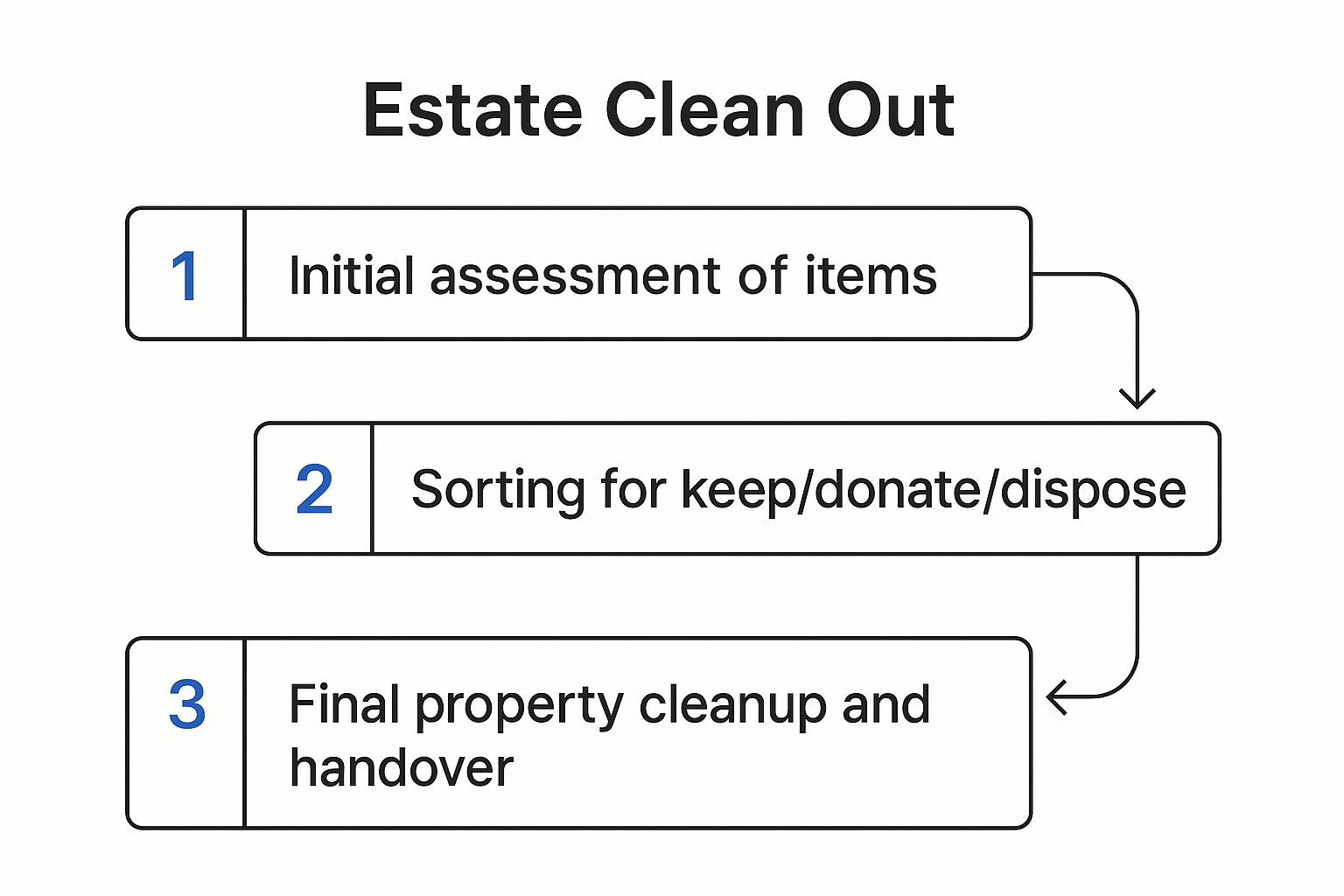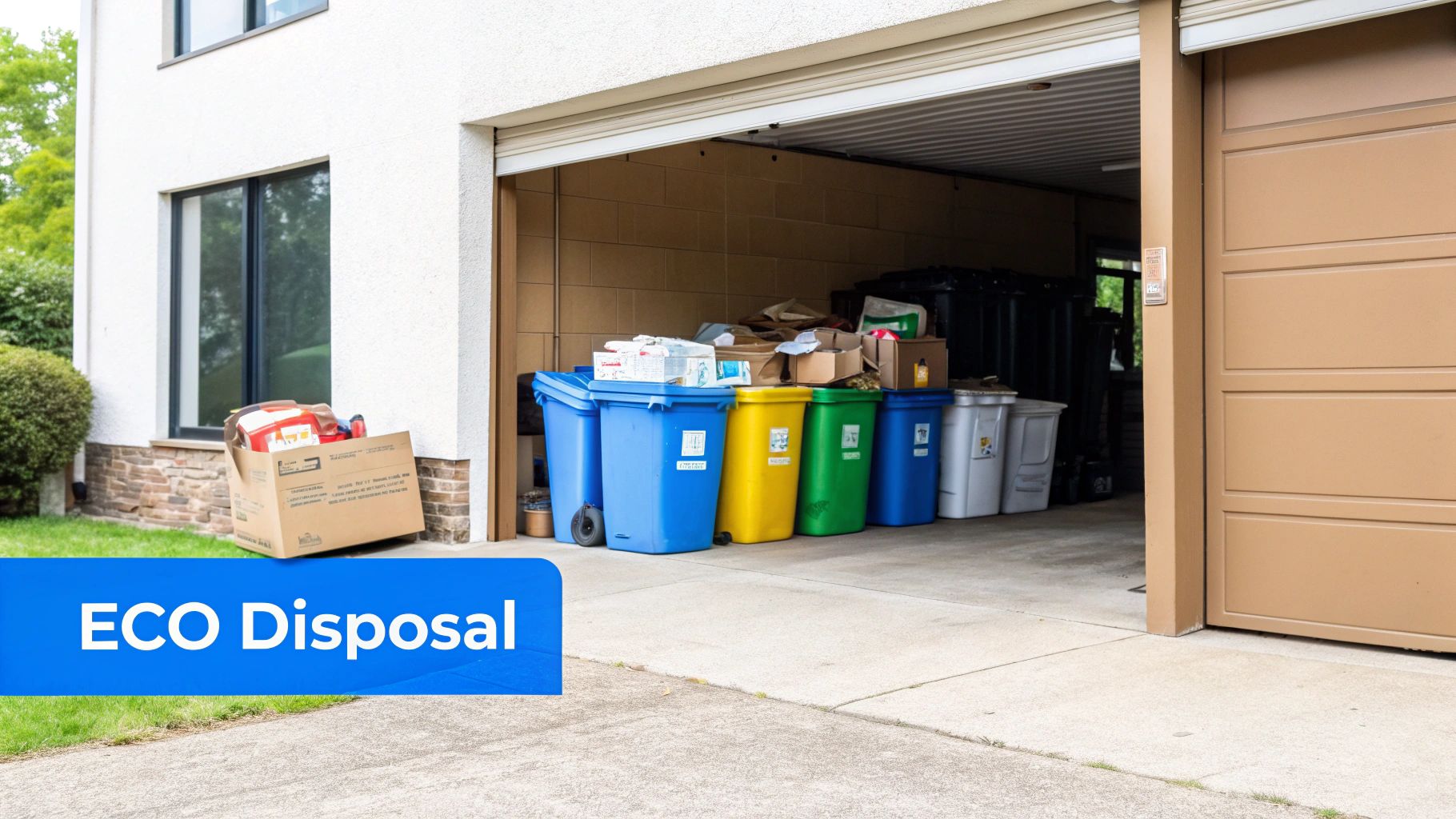Estate Clean Out Services Your Compassionate Guide

Think of an estate clean out service as a compassionate project manager for a loved one's belongings. This is so much more than simple junk removal; it's a complete, white-glove service designed to respectfully sort, organize, and clear out a property during what is often an overwhelming and emotional time.
A Deeper Look at the Cleanout Process
So, what exactly does an estate cleanout involve? It’s the methodical process of emptying a home after a major life event—most often, after a family member passes away. This isn't like a standard cleanout you'd do when moving. It involves sifting through a lifetime of accumulated possessions, from furniture and family heirlooms to personal documents and keepsakes.
The whole point is to leave the property completely empty and ready for its next chapter, whether that means putting it on the market, renting it out, or handing the keys to a new family member.
Professionals in this field handle the heavy lifting, both physically and emotionally. They bring a calm, structured approach to what can otherwise feel like a chaotic and painful task for a grieving family.
What Does the Service Actually Do?
A professional team takes a monumental job and breaks it down into a manageable project. Their involvement typically covers a few key areas:
- Sorting and Categorizing: They carefully go through every single item, separating personal keepsakes from valuable assets, and figuring out what can be donated versus what needs to be disposed of.
- Logistics and Removal: The team coordinates the physical removal of everything. This includes arranging for donation pickups, bringing in junk haulers, and handling any specialized disposal that might be required.
- Property Preparation: Once empty, they leave the property in a "broom-swept" condition, ensuring it's clean and clear for real estate agents or the new owners to take over.
An estate cleanout isn't just about hauling away stuff. It's about helping families navigate a difficult transition with respect, efficiency, and compassion.
This process is far from random. It follows a structured, multi-phase workflow that ensures nothing is overlooked.
The Four Core Phases of an Estate Cleanout
To really understand how these services operate, it helps to see the process broken down. Most professional cleanouts follow these four distinct phases, turning a huge undertaking into a step-by-step plan.
| Phase | Key Activities | Primary Goal |
|---|---|---|
| 1. Consultation & Assessment | On-site walkthrough, discussion of goals (keep, sell, donate), providing a detailed quote. | To understand the scope of the project and create a clear, agreed-upon plan of action. |
| 2. Sorting & Organization | Systematically categorizing all items, setting aside valuables, and separating personal keepsakes for the family. | To methodically process the contents of the home and ensure important items are preserved. |
| 3. Removal & Liquidation | Coordinating donation pickups, managing junk removal, and assisting with selling valuable items if requested. | To efficiently and responsibly clear the property of all designated contents. |
| 4. Final Cleaning & Handover | Performing a final sweep and light cleaning, ensuring the property is completely empty and ready. | To deliver a move-in or sale-ready property back to the client. |
This systematic approach is what makes professional services so valuable—they bring order to an otherwise overwhelming situation.
This infographic gives a great visual overview of the typical workflow.

As you can see, a clear system streamlines everything from the initial assessment to the final handover. And it’s an industry that's definitely growing. The junk removal and cleanout market is expected to hit a valuation of $1.2 billion by 2025, which really shows how many families are relying on this kind of professional support.
Specialized Situations and Scopes
Of course, not all cleanouts are the same. The scope of estate clean out services can change dramatically based on the property's condition.
Some situations demand more intensive work and specialized knowledge. For instance, these services are invaluable when it comes to the complex and sensitive process of selling a hoarder house, a scenario that often involves staggering amounts of clutter and even potential biohazards.
By expertly managing these challenging situations, professionals provide immense relief and ensure the property can be safely and efficiently prepared for sale.
Navigating the Costs of a Professional Cleanout

So, what’s this going to cost? It's the big question, and the honest answer is: it depends. The price for an estate cleanout isn't a simple, flat number you can look up. It's a custom quote that hinges entirely on the specifics of the property and the job itself.
Think of it this way: clearing out a small, two-bedroom apartment is a completely different project than tackling a cluttered three-story house with a packed basement and garage. The size of the home and the sheer volume of items are the two biggest factors driving the final price.
Key Factors That Influence Pricing
A few key variables will cause the price to swing up or down. If you know what they are, you’ll have a much better idea of what to expect when the quotes start coming in.
- Property Size: More square footage means more time and a bigger crew needed to clear it out efficiently. Simple as that.
- Item Volume: This is often more important than the size of the house. A hoarder's small cottage can be a much bigger job than a sparsely furnished mansion.
- Accessibility: Is it a fourth-floor walk-up? Are the hallways narrow? Is parking a nightmare? Anything that makes the physical work harder and longer will add to the cost.
- Specialized Disposal: If there are hazardous materials like old paint or chemicals, you’ll pay extra for proper disposal. The same goes for huge, awkward items like a grand piano or a hot tub.
To give you a ballpark idea, national averages in 2025 put a typical cleanout around $1,250. But that’s just an average. The real-world range can be anywhere from a few hundred dollars to $6,000 or more for a truly massive job.
Understanding Different Pricing Models
When you start gathering quotes, you'll probably see a couple of different ways companies structure their fees. It's helpful to see some insights into professional service pricing from similar industries to get a feel for how these models work.
Some companies will give you a flat fee for the whole job. They’ll do an in-person walkthrough and give you one number that covers everything. This is great for peace of mind.
A flat-fee quote is like a contract for a finished job. You know the exact cost upfront, regardless of minor delays, which can provide significant peace of mind during a stressful time.
Other services charge an hourly rate plus any fees for dumping or recycling. This can be a great deal for smaller, straightforward jobs that won't take much time. The risk, of course, is that a project with unexpected complications can get expensive fast.
It’s also smart to understand how these costs compare to other ways of liquidating an estate. For example, check out how estate sales fees are structured in our detailed guide. No matter which pricing model you're looking at, always insist on a detailed, written estimate so there are no surprises on the final bill.
The True Value of Hiring Professional Help
Let's be honest. Beyond the sheer logistics of sorting through a lifetime of stuff, the biggest reason people hire estate clean out services is for something you can't put in a box: relief. It’s the profound weight off your shoulders when you hand over an emotionally exhausting job to a team that gets it.
Think about the typical DIY approach. A family, already grieving, tries to tackle a parent's home. Weekends vanish into a blur of sorting, with every photo album and forgotten keepsake triggering a fresh wave of memories and sadness. Disagreements pop up over what to keep, progress feels agonizingly slow, and the whole thing drags on for months. It’s draining.
More Than Just Muscle
Now, picture this instead. An experienced crew shows up with a clear game plan and a compassionate attitude. They work methodically, setting aside the valuables and sentimental items you’ve already pointed out while efficiently clearing everything else. A project that might have taken your family six weekends is often done and dusted in just a couple of days.
This isn't just about moving fast; it's about getting your time back to actually grieve and be with your family. Professionals handle the tough stuff you might not even think about:
- Safety First: They know how to safely deal with potentially hazardous materials like old paint cans, mystery chemicals in the garage, or pest-infested furniture that could be a health risk.
- An Emotional Buffer: A professional team acts as a neutral third party. This simple fact can dramatically reduce family squabbles over who gets what, turning down the temperature on an already stressful situation.
- Getting Market-Ready: They understand what it takes to get a property "broom-swept" and ready for a realtor to see. This can seriously speed up the process of selling the home.
Hiring an estate clean out service is really an investment in your own well-being. It lets you focus on your family and healing, not on the overwhelming logistics of clearing a house.
Ultimately, the real value is peace of mind. Yes, the service has a cost, but the emotional and mental toll it saves you from is priceless. It turns a monumental burden into a manageable process, giving you the space you need to navigate a difficult time. A good team doesn't just clear out a house; they provide the support system that helps you move forward.
How to Choose the Right Estate Cleanout Partner

Picking a company for an estate cleanout is one of the most important calls you'll make in this entire process. You're not just hiring movers; you're trusting a team with a lifetime of someone's possessions and memories.
Think of it like choosing a contractor for a major home renovation. You need someone with a solid reputation, the right skills, and completely transparent practices. The wrong partner can turn a difficult situation into a nightmare of added stress, surprise costs, and mishandled belongings. The right one brings efficiency, compassion, and most importantly, peace of mind.
Your Vetting Checklist
Before you even think about signing a contract, you need to make sure any company you're considering checks a few non-negotiable boxes. These are the green flags that signal you're dealing with a trustworthy, professional service.
- Proper Insurance and Licensing: This is the absolute bare minimum. The company must carry liability insurance to protect the property from any accidental damage. Don't be shy about asking to see proof.
- Verifiable Testimonials and Reviews: Look for genuine feedback from past clients on sites like Google or Yelp. A consistent pattern of positive reviews is a great sign that they know what they're doing and treat their customers well.
- Transparent Pricing: A reputable company will insist on an on-site walkthrough before giving you a detailed, written estimate. Be very wary of any vague quotes offered over the phone without ever seeing the property.
A company's willingness to answer tough questions upfront is a direct reflection of its integrity. If they get defensive or evasive about how they handle valuables or their insurance coverage, consider it a major red flag and move on.
Powerful Questions to Ask During a Consultation
Once you have a shortlist, it's time to dig a little deeper. The way they answer these questions will tell you everything you need to know about their standards and how they'll handle the job.
- How do you handle sentimental or valuable items? A professional crew will have a clear, strict protocol. They should set aside anything that even looks valuable—jewelry, photos, important papers, cash—and let you know about it immediately.
- What is your process for donations and recycling? A responsible company prioritizes keeping items out of the landfill. Ask them which local charities they partner with and how they approach recycling.
- Can you provide a detailed, itemized quote? This is key. An itemized quote ensures you know exactly what you’re paying for and helps you avoid any nasty surprise fees on the final bill.
This process of vetting a partner is very similar to finding the best estate sale companies for your needs—it all comes down to careful research and asking the right questions. Taking the time to do this diligence upfront will help you choose a team that makes this difficult process feel smoother and far less stressful.
Handling an Estate Cleanout on Your Own
While hiring a professional service is a huge help, sometimes you need to tackle an estate cleanout yourself. Whether it's to save money, stick to a specific timeline, or simply a personal choice, going the DIY route can be empowering.
But let's be honest: it's a massive undertaking. The key is to treat it like a real project, not just a weekend chore you can power through. You absolutely must break the job down into smaller, more manageable stages. Don't even think about clearing the whole house at once. Focus on one room at a time to build momentum and keep yourself from burning out.
Creating Your DIY Cleanout Plan
A good plan is your best defense against the chaos that can easily take over. First, set a realistic timeline. Whatever you think it will take, add more time. Rushing leads to regret over items you wish you hadn't tossed and a whole lot of unnecessary stress.
Next, get your team together. Trying to do this alone is a recipe for physical and emotional exhaustion. Call in trusted family or friends and make it a "sorting party." The extra hands are great, but the moral support is even better. Give people specific jobs to keep things moving efficiently.
The most effective DIY cleanouts rely on a simple, consistent sorting system. This is the secret to avoiding decision fatigue and making sure every single item gets handled thoughtfully, not just shoved into a random box to deal with later.
A simple and powerful strategy is the four-box method. As you work through a room, every item you pick up goes immediately into one of four boxes or designated areas:
- Keep: For personal items family members have claimed.
- Sell: For anything with resale value you plan to liquidate.
- Donate: For gently used goods that can find a new home.
- Dispose: For trash, broken items, and anything truly unusable.
This system forces an immediate decision on every item. No more "maybe" piles that just sit there and stall your progress. To keep you on track from start to finish, our detailed estate cleanout checklist provides a step-by-step framework that covers every part of the process.
Managing the Logistics
Once you've got the sorting system down, you have to deal with the logistics of getting everything out of the house. This usually means renting a dumpster for the "dispose" pile—just be sure to check your local rules on what you can and can't throw away.
For your donation items, schedule pickups with local charities as early as you can. Their calendars fill up fast. The final, and often most rewarding, step is preparing the property itself. Once everything is cleared out, a deep clean makes the home feel fresh and ready for whatever comes next, whether that’s putting it on the market or welcoming new residents.
How the Cleanout Industry Is Evolving

The world of estate cleanouts is changing for the better. Gone are the days when "clearing a house" just meant renting a dumpster and tossing everything inside. The old haul-and-dump model is quickly fading, replaced by a much more responsible and thoughtful approach.
It’s all part of a bigger shift in how we think about waste and community. At the heart of this evolution is a real commitment to sustainability. Modern estate clean out services aren't just focused on emptying a property; they’re trying to keep as much as possible out of the landfill.
This means carefully sorting items for donation to local charities, setting aside materials for recycling, and giving usable goods a second chance to be useful. It’s a win-win—less waste for the planet and more support for the community.
Technology Is Making Things Easier
Alongside this green shift, technology is finally making the entire process less of a headache for families, especially when everyone is spread out.
- Digital Inventories: Imagine getting a photo catalog of everything in the home sent to your email. This allows family members in different states to scroll through, tag what they want to keep, and make decisions without an expensive plane ticket.
- Online Auctions: For items with real value, platforms like DIYAuctions give you a direct path to sell them to a wide audience of interested buyers. This is a game-changer for maximizing an estate's value instead of just letting things go for pennies on the dollar.
This isn't happening in a vacuum. It’s part of a massive global cleaning services market that was valued at around USD 415.93 billion in 2024 and is only getting bigger. You can read up on these cleaning industry trends to get a sense of the scale.
The modern estate cleanout service is transforming into an eco-conscious partner. Their goal is not just to clear a space but to thoughtfully rehome, recycle, and repurpose a lifetime of possessions.
This new way of thinking adds a ton of value. By blending sustainability with smart technology, today’s cleanout professionals offer a service that feels right—it's efficient, responsible, and perfectly aligned with what modern families need.
Common Questions About Estate Cleanouts
When you're facing an estate cleanout, a lot of questions pop up. It’s a tough time, and getting straight answers is the first step toward making a confident decision. Let’s walk through some of the most common things people ask.
How Long Does a Cleanout Take?
This is usually the first question on everyone's mind. The honest answer is: it depends. A small apartment might be cleared out in a day or two, but a large family home packed with decades of belongings could easily take a week or more. A pro team can only give you a solid timeline after they’ve seen the property in person.
What Happens If You Find Valuables?
This is a big one. What if the crew stumbles upon jewelry, cash, or important papers?
A reputable company has a clear system for this. Any unexpected valuables—things like art, old coin collections, or family documents—are immediately set aside. Their job is to secure those items and let the family or estate executor know right away. Many can even connect you with a trusted appraiser to figure out what something is really worth.
Do I Have to Be There the Whole Time?
Thankfully, no. Your presence is most important during the initial walkthrough. That’s when you’ll point out exactly what’s staying and what’s going.
Once you’ve approved the plan and the "keep" items are safely separated, you can step back and let the team handle the heavy lifting. They’ll manage the sorting, hauling, and cleanup, keeping you updated without you needing to be on-site 24/7.
What About Insurance and Liability?
This is a critical point. Any professional estate cleanout company you consider must be fully licensed and insured.
Think of it as a safety net. It protects your property from any accidental bumps or scrapes that might happen during the job. Before you sign anything, always ask to see their proof of insurance. It’s a simple step that ensures you're completely covered.